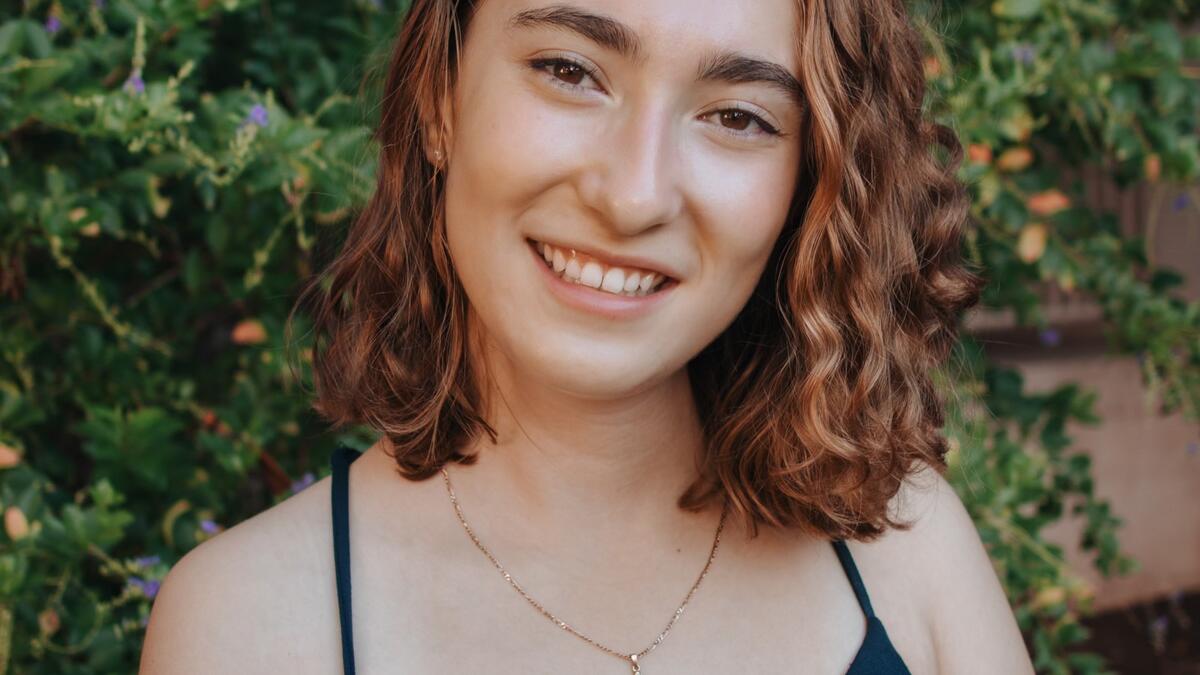Family legacy, passion for helping children experiencing trauma inspired criminal justice graduate

Ciara Ruiz-Earle is the School of Criminology and Criminal Justice's fall 2023 Outstanding Graduate. Courtesy photo
Editor’s note: This story is part of a series of profiles of notable fall 2023 graduates.
From an early age, Ciara Ruiz-Earle had firsthand, family experience with the criminology and criminal justice field. Her mother was a child abuse victim advocate.
Ruiz-Earle, the ASU School of Criminology and Criminal Justice’s fall 2023 Outstanding Graduate, developed her own passion for working with children navigating the repercussions of trauma and abuse. To help serve that community, Ruiz-Earle co-founded a nonprofit organization that directly impacts the lives of child victims of violent crimes. Through it, she met two sisters around her own age who had been deeply impacted by child sexual abuse.
“My interactions with them and others like them helped to personalize the suffering trauma survivors experience and sparked my desire to better understand and help this underserved community,” Ruiz-Earle said of the organization, which has been helping child victims since 2016.
“We started small, but now we serve around 150 individuals each year. It wouldn't be possible without the generosity of my community, who come together to make it all achievable,” Ruiz-Earle said. “We work with several doctors' offices, dentists, restaurants and more to collect gifts and donations. Then, our dedicated volunteers work hard to make the organization and distribution process run smoothly.”
Her “aha” moment, when she decided to pursue a criminal justice career, occurred when she took an advanced placement psychology course in high school.
“While I already knew who I wanted to help, I now understood how I could help them,” Ruiz-Earle said. “It took a little while to refine my ideas, but it became clear that a path that combines clinical psychology and criminology would allow me to understand the justice system and gain the skills to help advocate for victims who have to navigate it.”
This semester Ruiz-Earle earned a Master of Science in criminology and criminal justice. In December 2022, she earned two Bachelors of Science at ASU, one in criminology and criminal justice and one in psychology, and was a student in Barrett, The Honors College.
Read on to learn more about Ruiz-Earle’s journey at Arizona State University.
Note: Answers may have been edited for length and clarity.
Question: What’s something you learned while at ASU — in the classroom or otherwise — that surprised you or changed your perspective?
Answer: I was incredibly fortunate to be selected for the Inside-Out prison exchange program. This program is a departure from traditional classroom settings, as it brings together 10 outside students like myself with 10 incarcerated individuals from a local medium-security women's prison. Our class sessions were filled with diverse perspectives, stories and shared vulnerabilities.
What struck me most profoundly was the realities of incarceration and the prison experience. It was a realization that these women, who had become my friends, transcended mere statistics or textbook cases. Their narratives were real and complex, woven with pain, resilience and humanity. Their stories were not isolated incidents but rather interconnected threads in the broader fabric of societal issues.
This experience was far more than an academic endeavor. It shifted my perspective on the justice system. It fueled my passion for advocating for marginalized communities, emphasizing rehabilitation over punishment and addressing the underlying societal issues that contribute to the cycle of incarceration. It illuminated the human faces behind the labels of "inmate" or "offender," revealing stories of resilience, pain and hope that reshaped my worldview and redirected my academic pursuits toward fostering change and promoting social justice.
Q: Which professor(s) taught you the most important lesson while at ASU?
A: While all my teachers have been exceptional, two professors have left a lasting mark on my academic journey.
Dr. Stacia Stolzenberg has been an anchor since my very first semester on campus. Her mentorship has extended far beyond academia, continuously nurturing my academic pursuits while challenging me to explore novel perspectives and questions. As my thesis chair for both undergraduate and master's theses and as my instructor in research methods, her teachings have been a source of knowledge, offering lessons not just in academics but in humility and grace. Dr. Stolzenberg, donning multiple hats as a teacher, researcher, mentor and more, is a symbol of intelligence and dedication.
Dr. Shi Yan's influence during my initial venture into graduate studies was profound. As a nervous 4+1This refers to accelerated programs that allow students to earn their bachelor's and master's degrees in five years total. student, feeling out of place among seasoned PhD candidates, Dr. Yan's Courts and Sentencing class offered an environment for growth. He recognized my unique position as a younger student, yet rather than letting insecurities hinder my progress, he challenged me to produce work on par with the class standards. His unwavering belief in my abilities propelled me beyond self-imposed limits, nurturing my strengths and pushing me to excel. His guidance shaped my academic approach and taught me resilience to confront challenges.
Q: What are your plans after graduation?
A: After graduation, I hope to complete a PhD in clinical psychology. I aim to make a firsthand and meaningful impact on the lives of those who have experienced trauma and abuse, particularly those who are involved with the criminal justice system. My plans involve providing evidence-based therapy, conducting relevant research and contributing to academic communities. I'm driven to help individuals heal and recover from trauma, sharing knowledge and my skills to support their well-being.
Q: If someone gave you $40 million to solve one problem on our planet, what would you tackle?
A: I'd concentrate on tackling the intersection between mental health issues and the cycle of incarceration. While incarceration stems from various factors, mental health issues often act as significant contributors. Investing in comprehensive resources and support systems would be crucial to prevent those affected from being swept into the justice system due to untreated mental health conditions.
This initiative wouldn't just be about diverting people from incarceration; it would prioritize mental health care, providing pathways for healing and stability, ultimately breaking the cycle that links mental health challenges to the criminal justice system. The goal would be to empower individuals with the necessary tools and assistance to navigate life's challenges, ensuring that their mental health struggles don't lead to a trajectory ending in incarceration but rather to a path of recovery and well-being.
More Sun Devil community

ASU president connects with veterans during town hall
Arizona State University President Michael Crow shared his family’s military background, provided university updates and…

Tested tips for taking exams
With May quickly approaching, many students are starting to prep for their most important tests of the year — final exams.Toni…

School of Transborder Studies celebrates 15th anniversary
During the summer before his freshman year at Arizona State University, Salvador Macias participated in the AGUILA Youth…

